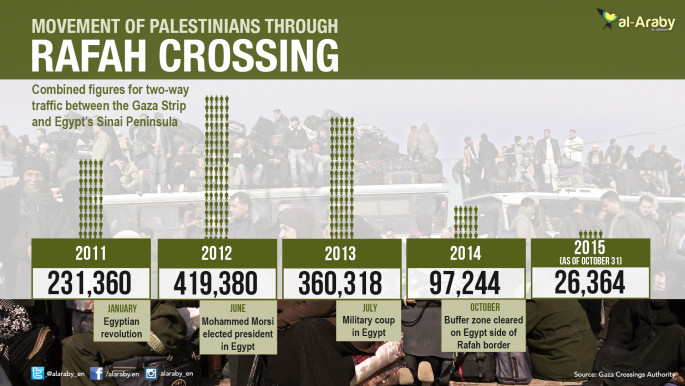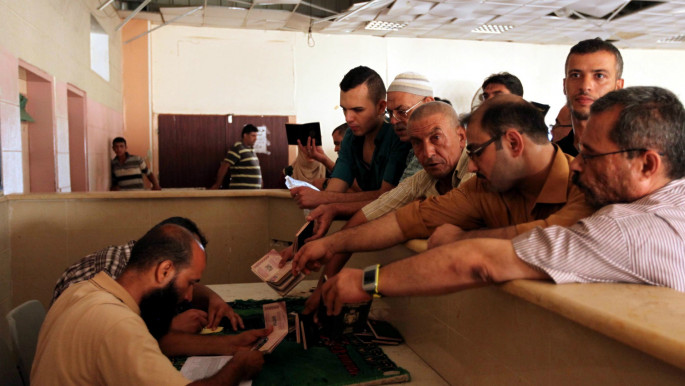Sisi's cross-border matchmaking opens Gaza's gates
But Hamas spokesperson Abu Zuhri called the plan a "unilateral arrangement" that "ignored the reality on the ground", and implied that Hamas would oppose any Rafah agreements made without the group's involvement.
Palestinians in Gaza continue to suffer under Israel's siege, and the crossing is currently opening just a couple of days every few months, so this could be a significant development.
| The Palestinian Authority must talk about this with Hamas - Ahmed Youssef, Hamas |
The deal would involve the Palestinian legislative guards - a security force of the PA - taking control of the Rafah crossing, on the border of Gaza and Egypt, as Cairo is unwilling to deal with Hamas, which remains in de facto control of the blockaded coastal enclave.
"What we have is an agreement that might be implemented in the near future, but the Palestinian Authority must talk about this with Hamas, which holds authority in Gaza," Ahmed Youssef, a prominent Hamas figure, told al-Araby al-Jadeed.
Hamas and the Fatah-dominated Palestinian Authority have been divided since Hamas were elected to power in 2006. The internecine fighting that followed saw Fatah largely routed from the Gaza Strip, and Hamas largely shut down in the West Bank - leaving the bitter rivals in charge of the separate territories.
Youssef said that discussions would aim to come to an "understanding" to ease restrictions on the blockade.
"There are sick people, ill people - once the Egyptian authority solves its security situation in the Sinai, they will find a way," he said.
Hamas needs the borders to open; the group is increasingly the focus of discontent in Gaza amid frustration at the blockade and the ongoing closure of the Rafah crossing.
|
|
|
|
The closure of Rafah crossing has been distastrous for Palestinians |
It is not, however, in Israel's interest to reopen the Egypt-Gaza border; in a bid to keep Gaza starving but living, they have eased restrictions slightly at Erez border, resulting in more Gazans being able to travel to the West Bank.
It is unclear where Egypt's motivations may lie; the country is extremely hostile towards Gaza, and appear determined to get rid of the Hamas movement there.
"Mahmoud Abbas doesn't care about the crossing or about Gaza," a Palestinian analyst told al-Araby al-Jadeed.
Abbas previously "bragged" that Egypt's flooding of the smuggling tunnels was in fact his idea.
Considering this, it may be that former head of preventive security Mohammed Dahlan is the missing link in this deal; Dahlan has extremely close relations with Egypt through his position in the UAE, and it may well be in his interest to broker such a deal.
Dahlan was effectively exiled by the PA after facing corruption charges - which were dropped in April this year.
The reports of Rafah's reopening coincide with news that in Cairo, Sisi was attempting to pressure Abbas to reconcile with Dahlan.
Meanwhile, workers have been attempting to salvage the tunnels under the border which were flooded by the Egyptian government. Residents of Rafah have reported seeing people using "suction devices" to attempt to drain the tunnels, and there have been attempts to try and reinforce others as they dry out.
Some young Gazans are becoming increasingly frustrated by Hamas, blaming them for the consequences of the siege, such as the electricity crisis. Therefore, a Hamas refusal to compromise over Rafah's reopening is likely to be poorly received by the Strip's beleaguered residents.
 |
|
| [click to enlarge] |
The Cairo deal
During the meeting between Sisi and Abbas in Cairo, Dahlan was reportedly a main subject of conversation.
Palestinian media was subsequently rife with speculation over whether there would be a reconciliation between the two rivals, with the Egyptian government reportedly telling Abbas that he must permit Dahlan's return.
Sisi has long been closer to Mohammed Dahlan than Abbas, viewing him as an emissary to the UAE.
Abbas reportedly acknowledged that Dahlan could return to Ramallah, but not "to Fatah". On Wednesday, al-Quds al-Arabi reported that courts in Ramallah said he should come back to deal with the corruption allegations.
In response, Fatah spokesperson Ahmed Assaf denied the rumours, which he said aimed to "mislead the Palestinian public opinion". Such reports falsely created the impression that Dahlan was able to play a role in the future of Palestine, he said.
 |
Of course this will benefit us as Palestinians, and Hamas in particular - instead of [Mahmoud Abbas] having full control of the movement… it will build Palestinian institutions |  |
In the occupied Palestinian territories, there has also been speculation that there were attempts to reconcile Abbas and Dahlan through the Jordanian secret service, which is reportedly close to both camps.
Jordan also a has close relationship with Abbas, although analysts have previously made the point that this is due to his position as head of the Palestinian Authority, rather than any deep personal loyalty.
Hamas' Youssef is broadly supportive of any attempts for Fatah to reconcile its internal differences.
"Of course this will benefit us as Palestinians, and Hamas in particular - instead of [Mahmoud Abbas] having full control of the movement… it will build Palestinian institutions," he said.
Regarding the connection between the deal to open the Rafah crossing and Fatah reconcilliation, Youssef said that he did not know "how related these issues are" but commented "this is the only way out for Fatah as an organisation, and we are hoping this will lead to something".
Hamas and Dahlan have an extremely difficult relationship in the past. While acting as head of Gaza's preventive security services, Dahlan was accused of torturing Hamas members in Gaza.
"This was eight years ago, we must look to the future and overcome these issues and these problems," said the analyst. "Then we can tackle the Israelis."
Yet Hamas and Dahlan have recently found a common enemy in the form of Mahmoud Abbas.
"They need each other," said a Palestinian analyst. "Hamas needs Dahlan and his connections to Egypt to help lift the seige, and Dahlan needs Hamas to help him come back to Gaza... [But] they will soon start fighting again."
Youssef said that the worsening conditions in Gaza prioritised the need for compromise.
"There is no future, there is no hope," he said. "There are 100,000 people without jobs and they can't find them because of the division [between Fatah in the West Bank and Hamas in Gaza]."
Meanwhile, sources close to Dahlan in London said he wanted to "embarrass Abbas" by visiting Cairo while the PA president was in town.
Abbas was also reportedly angered by the Quartet's Tony Blair dealing with Dahlan instead of him.
Abbas' team and Dahlan have both encouraged a plan to put the Palestinian territories under UN protection, which proponents say could unite Palestinian factions as well as improve conditions for Palestinians.
However, critics say that it could lead to a "new" Palestinian Authority, in which Dahlan would likely play a stronger role. Palestinian media analysts have noted that their political leaders have been attempting to use the latest violence to their advantage.






 Follow the Middle East's top stories in English at The New Arab on Google News
Follow the Middle East's top stories in English at The New Arab on Google News


